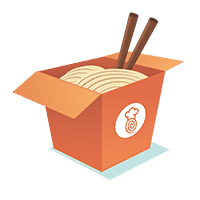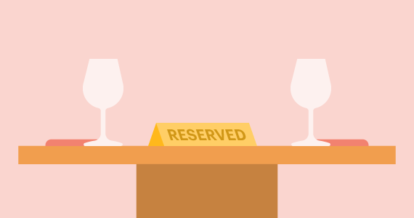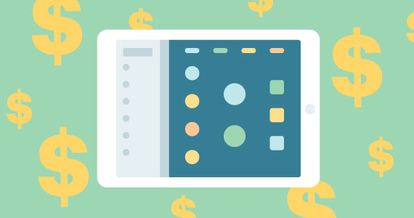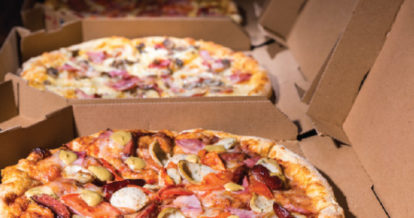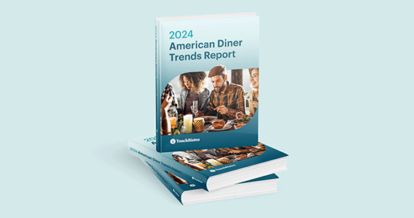The guest experience starts way before someone takes their first bite of your delicious food.
Are they able to easily discover your restaurant? Does the menu have options for vegetarians or vegans?
Are they able to get a table?
Just like party RSVPs equip hosts with the information they need to accommodate guests, restaurant reservations enable front-of-house, back-of-house, and management teams to work together to create that great guest experience for everyone who walks through your doors. When restaurants know in advance who they’ll be serving, how large the party will be, and what occasion is being celebrated, they can customize the service, food recommendations, and overall guest experience.
While some restaurants forego reservations in favor of a first-come-first-served policy, restaurants that take reservations reap the business benefits of a more predictable service. This is especially true of venues that opt for restaurant reservation software instead of simply relying on a phone and log book. Modern reservation systems optimize restaurant operations by enabling restaurateurs to provide guests with stellar experiences that turn first-time visitors into regulars.
In this guide to restaurant reservations, you’ll learn:
- A brief history of restaurant reservations
- How reservations benefit each role in a restaurant
- Why your restaurant should have a reservation system
- The business benefits of restaurant reservations
Here’s the scoop on restaurant reservations and reservation management technology.
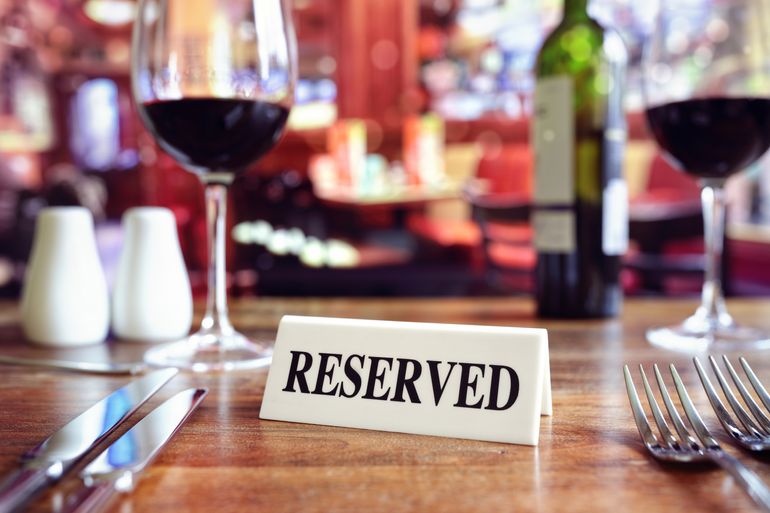
A Brief History of Restaurant Reservations
Today, restaurant reservations can be made over the phone, online, or even via an SMS (text) message. A reservation guarantees diners a table at the restaurant of their choice when they arrive. For the most part, diners don’t have to put down a deposit to reserve a table and the check is settled after the meal has ended.
While these rules of restaurant reservations are the norm today, things were quite different in the past. In the 19th century, reservations were used to book private dining rooms in restaurants, according to Rebecca Spang, author of the Invention of the Restaurant, in an interview with The Atlantic. Restaurants had both communal dining rooms with several tables, and small rooms for private dining. When a private dining room was reserved, the meal was ordered and paid for in advance so that it could be served when guests arrived.
Contrary to popular belief, the rise of telephones didn’t affect the popularity of restaurant reservations or dining out. Instead, after World War I, as more of the American population began working, dining out became a necessity rather than a luxury, Spang explains.
In 2017, TouchBistro found that half of consumers were eating out between two and four times each week, in part due to reservation technology making it even easier for them to make dining out part of their routines.
We’ve reached a tipping point where reservation software like TouchBistro Reservations and other restaurant technology is not just nice to have, but essential to modern dining.
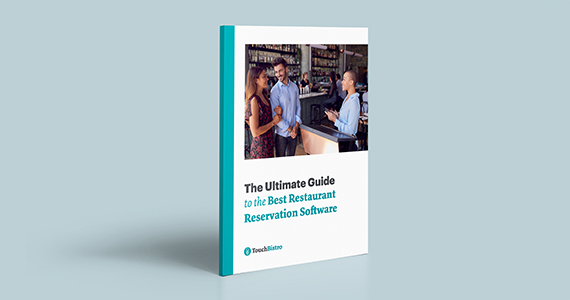
Compare the top restaurant reservation systems on features, integrations, pricing, and more.
How Reservations Benefit Each Role in a Restaurant
If your restaurant has a no reservation policy in effect, you may change your mind after seeing how reservations benefit everyone in the restaurant – from your staff to your customers.
Managers
Managers need to know what’s going on at their restaurant so they can coordinate staffing, communication, and inventory. When managers know how many guests to expect through reservations they can better schedule staff and resources in case of no shows. Plus, an influx of reservations clues managers in on giving servers extra training on busy nights.
Host
The host’s job is to seat hungry people and to set diners’ expectations for how long they’ll have to wait for their meal. When a restaurant takes reservations, hosts can better anticipate when tables will turn over in order to give more accurate wait times and avoid overcrowding in waiting areas.
Servers
Servers are the face of your customer experience. When customers make a reservation, they can share details about the meal – is it a celebration? – or let staff know if anyone in the party has a food allergy.
When servers are equipped with this information, they can act on it without being asked by customers. Servers can bring out dessert for a birthday celebration, or point out the menu’s dairy-free options. When the front-of-house team can anticipate customers’ needs, they can go above and beyond customer expectations from the beginning, and convert occasional restaurant-goers into lifelong regulars.
Guests
Guests benefit most from reservations. First, when customers make a reservation, they know that their table is guaranteed. Instead of showing up at a restaurant arriving only to wait an hour for a free table, they can make their reservation over the phone, in person, or online and their seating will be guaranteed. They can even directly communicate with the restaurant if they need to change or cancel their reservation.
Second, customers benefit from the ability to request special accommodations when they make a reservation, which ensures they get the experience that they expect (or even one that exceeds their expectations).
When restaurants take reservations, it’s a win-win on both sides of the table.
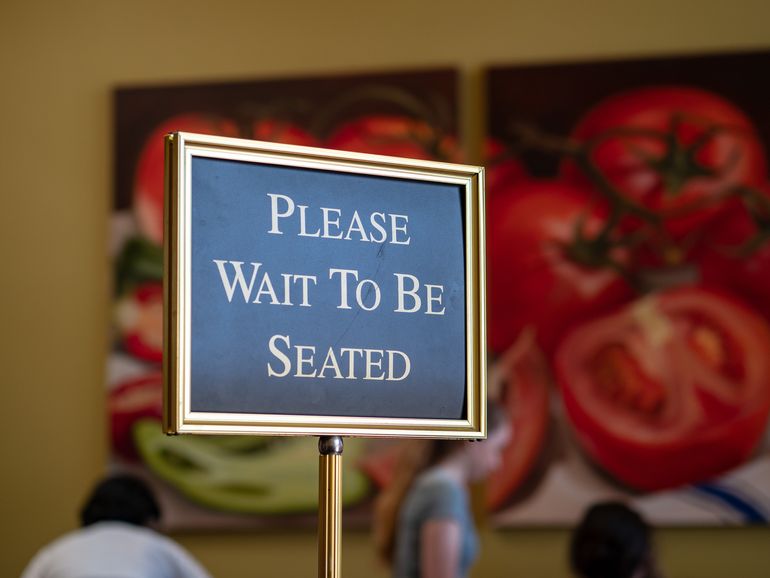
Why You Need a Reservation System
If your restaurant already accepts reservations, what system do you have in place to take and organize them? Are you only able to accept reservations over the phone? Does your team record the reservations manually in a log book or use a more tech-savvy approach?
Modern restaurant reservation systems – especially those that are integrated with your POS – can clear up clutter, improve accuracy, make business more predictable, maximize revenue, and help create personalized guest experiences.
Here are five reasons why you should consider upgrading your current process to a digital reservation system.
1. Less Clutter
Modern reservation systems can be managed through something as small as an iPad. This means your hosts can ditch the paper notebooks and keep the host stand clutter-free – something that makes a great first impression on customers.
2. Increased Accuracy
A reservation system reduces errors that can be made by taking reservation information over the phone. When customers book online, there’s less risk that a reservation will be booked for a party of seven instead of eleven, or that you might forget to make a note about an important food allergy.
3. More Predictable Wait Times
As a customer, there’s nothing worse than being asked to wait 30 minutes for a table only to end up waiting for more than an hour. A reservation system helps businesses optimize restaurant seating layouts, so that they can accommodate more customers and give guests more accurate wait times. If the wait becomes longer than anticipated, the host can adjust expectations and offer a complimentary snack or beverage.
You can also predict these times better because an integrated reservation system uses information from your actual restaurant layout. This means that the system considers other table seating times and the courses they’re on, so you can give your guests a more accurate estimate.
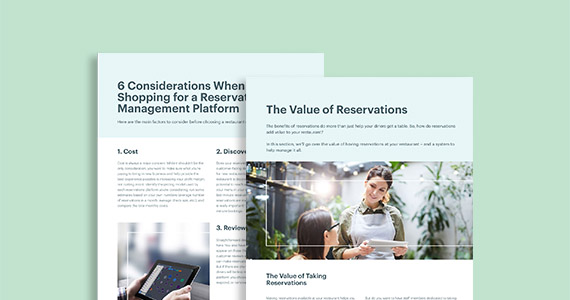
Learn how a restaurant reservations system can help your business thrive.
4. Automated Reservation Reminders
A modern reservation system can send guests automated reservation reminders and waitlist updates via text and email. This helps reduce no-shows by minimizing the chance your guest forgot their reservation.
Reservation software is also equipped with two-way text or email notifications, so guests can let you know if they’re running late or need to cancel in real-time. This feature frees the host up to serve customers who are already present, instead of calling incoming guests to ask about their whereabouts.
5. Customer Profiles
Hospitality is all about the guest experience. Reservation technology can save customer information like contact details, how often they’ve visited, dietary restrictions, special dates and anniversaries, and even how much the customer has spent. This customer information can be integrated into marketing campaigns to more accurately target guests through personalized promotions.
And when you know you have a regular coming in for a big celebration, you can make the extra effort to cater the experience to them – maybe assign them to top-performing staff or throw in a free dessert for a celebration.
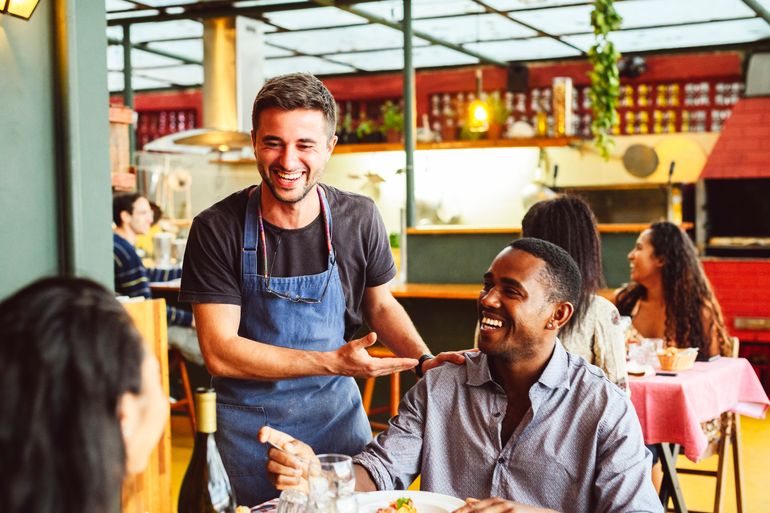
How Reservation Systems Help Your Bottom Line
So how do the above benefits affect the bottom line at your restaurant?
When you use a reservation system that integrates directly with your POS system, it’s easy to see how reservations affect revenue.
Reservations Are Maximized
Reservation technology can increase your restaurant’s revenue by syncing with your restaurant’s POS and maximizing the number of reservations you can manage on any given day.
For instance, a system like TouchBistro’s integrated reservations is synced directly with the digital floor plan in your POS, giving you the ability to save alternate seating arrangements, block off specific tables, and control seating times. Reservation software can then help you optimize and fill the number of tables that are free by making those available for guests to book. This feature saves the host from having to check the POS to see which tables are available and update the reservation system manually.

Learn how a restaurant reservations system can help your business thrive.
Analytics Make Business More Predictable
Another benefit of having a POS and reservation system that communicate with each other is their ability to produce powerful business insights about the past, present, and future.
Past
A POS and reservation system integration can show you how reservations affected sales in the past. This helps your team set realistic business goals by basing them on historical data. For example, if your restaurant had 30 reservations for Father’s Day last year, plan around a similar number of reservations this year and staff up accordingly. If you notice your numbers are low, you can refocus your marketing efforts to boost reservations.
And even if current reservations are impacted by COVID-19, looking at historical data can give you a benchmark to see where your business should be (and how you might be able to bridge the gap).
Present
An integrated system can show you real-time shift revenue and average guest spend, so you can encourage servers to upsell as needed in order to meet daily sales goals.
An integrated reservation system also helps track each guest’s status so you can turn more tables and accurately quote wait times. And the more tables you turn, the more revenue you’ll generate for your restaurant.
Future
Analytics generated by an integrated system make for better forecasting. When your team knows how many guests to expect, they can maximize revenue by optimizing restaurant seating, scheduling more staff (or less) staff, and brushing up on training to ensure that they provide the best customer experience possible. For restaurants reopening on a tight budget, this kind of forecasting can also help to better anticipate food and labor costs.
You Receive More Reviews
A 2017 survey found that sixty-eight percent of restaurant goers have tried a new restaurant because of a positive review. But while guests may have had a great experience at your restaurant, they probably won’t write about it unless asked. A good reservation system can automatically prompt guests to write a review of their experience, which will help you gain more reviews, and therefore, more customers.
Download our free inventory template
